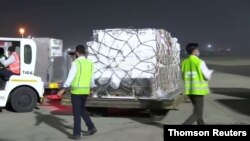The first shipment of critical medical supplies arrived in India Tuesday as the country continues to struggle with a catastrophic second wave of COVID-19 infections, a situation described as “beyond heartbreaking” by the head of the World Health Organization.
A plane from Britain filled with 100 ventilators and 95 oxygen concentrators, which collects atmospheric air and converts it into pure oxygen, landed at the airport in Delhi before dawn. The British high commission in India says a total of nine transport planes will deliver nearly 500 oxygen concentrators and 140 ventilators to the South Asian nation this week.
Other nations have also pledged to ship badly needed medical supplies to India. France has promised to send ventilators, oxygen generators and containers of liquid medical oxygen by next week, with Germany, Israel and Pakistan, India’s neighbor and longtime arch-enemy, sending personal protective gear, treatments and diagnostic tests along with ventilators and oxygen.
WHO chief Tedros Ghebreyesus told reporters in Geneva Monday the global health agency “is doing everything we can, providing critical equipment and supplies, including thousands of oxygen concentrators, prefabricated mobile field hospitals and laboratory supplies.”
He noted the WHO has already announced 2,600 extra WHO staff members will go to India to help with efforts to fight the disease.
The international assistance comes as India reported another 323,144 new confirmed COVID-19 cases Tuesday, marking the sixth consecutive day of more than 300,000 infections. The country’s health care system is nearing complete collapse, with hospitals crammed with so many coronavirus patients that authorities have been forced to convert train carriages into COVID isolation wards.
India also posted another 2,771 COVID-related deaths Tuesday, as crematories have been busy night and day burning people’s remains. The capital, New Delhi, remains under a lockdown that was extended Monday for another week.
This second wave has been blamed on the spread of more contagious variants of the virus, plus the easing of restrictions on large crowds when the outbreak appeared to be under control earlier this year.
The situation has prompted many nations to suspend all passenger air travel to and from India. Australia on Tuesday suspended direct passenger flights from India until May 15, leaving thousands of Australians stranded there, including several cricketers playing in the Indian Premier League.
India has administered more than 142 million doses of the vaccine, but only 1.6% of its estimated 1.4 billion people are fully vaccinated, according to the Johns Hopkins Coronavirus Resource Center.
The country is facing a shortage of COVID-19 vaccines as it struggles with a shortage of raw materials needed to manufacture doses.
Having already pledged to send raw materials to India to produce vaccines, the Biden administration announced Monday it will share its stockpile of 60 million doses of the AstraZeneca vaccine with other countries, with India likely to be a major recipient. The two-dose vaccine, which has not been approved for use in the United States, will be shipped overseas once they pass a federal safety check.
The doses were manufactured at a Baltimore manufacturing plant that ruined 15 million doses of the one-shot Johnson & Johnson vaccine after the ingredients were accidentally mixed with the ingredients that make the AstraZeneca vaccine. The plant was recently shut down by federal regulators over safety concerns.
Meanwhile, the executive committee of the European Union has filed a lawsuit against AstraZeneca for failing to fulfill its contract to deliver millions of doses to its 27-member nations.
The British-Swedish drugmaker had initially promised to deliver more than 300 million doses by the end of June, but has since cut that number down to just 100 million doses.
The company issued a statement saying it “regrets” the European Commission’s action, calling the lawsuit “without merit.”
The lawsuit is the latest blow to AstraZeneca’s efforts to produce a COVID-19 vaccine that can be stored at regular temperatures, making it easier to use and cheaper for many of the world’s poorer nations. The vaccine has been plagued by a host of problems, including reports of possible blood clots that prompted many nations to halt their initial rollouts of the vaccine.







